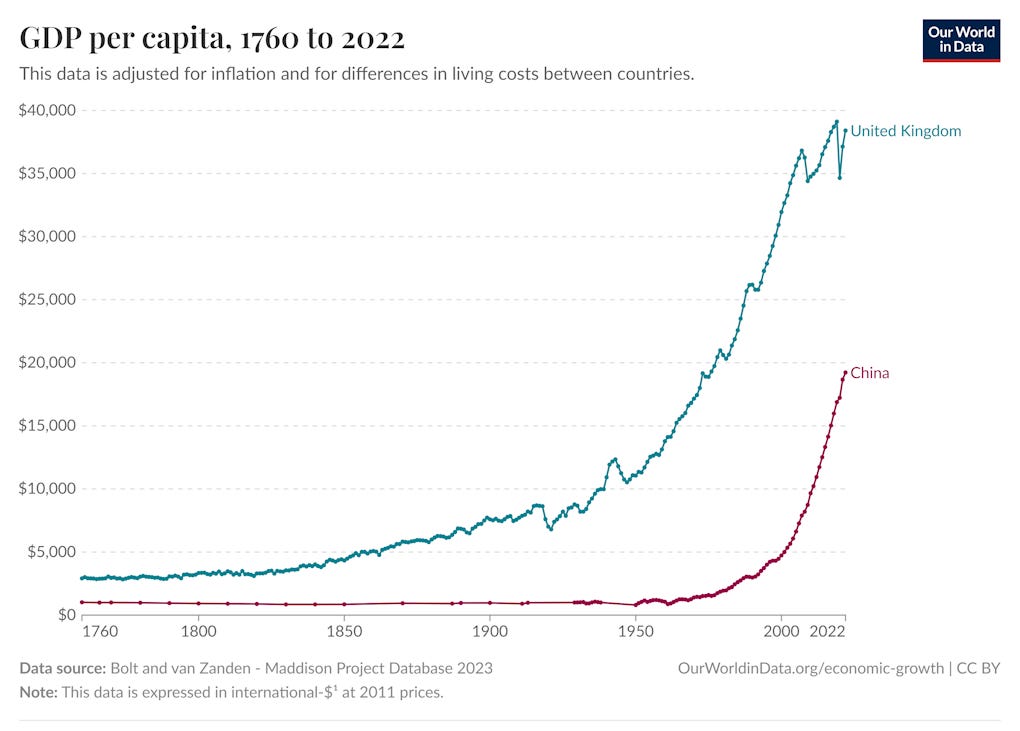|
 |
“The blood of Numenor is all but spent, its pride and dignity forgotten” — Elrond
“Oh, Daddy was a caveman/ He played ball in skins, with shirts/ He dreamed of lights up in the sky/ While scratching in the dirt” — Tom Orley
I suppose it’s natural, when your country is in a state of steep decline, to take heart in the great achievements of your ancestors. Yishan Wong, the former CEO of Reddit, is from Pittsburgh, but his ancestors are from China. In a long post on X, he expounded a theory that China will always renew itself and rise to meet any challenge, because it’s conscious of its 5000 years of history:
Every kid in China grows up knowing that they're part of a 5000-year-old civilization…What it means is that even if you're a bunch of peasants right NOW, your people have always had civilization. The civilizations aren't perfect or eternal - they rise and fall when the rulers get corrupt and stupid - but civilization is part of the fate of your people, almost the natural default state of things. Even when it's fallen, it's always come back, because that's how your people DO things…
It's like knowing your family has been rich for generations and you're just in one of the down periods. That's different from having been poor and primitive from the beginning of time. It means that Chinese people internalize a default notion of "yeah, we have a civilization, it's just a down period right now, but eventually another strong leader will come about, we'll all work hard, and our civilization will rise again as it has dozens and dozens of times throughout history."…[F]or most Chinese history, China was the world-leading civilization and Chinese people know that…
I was lucky in my youth to work for a boss who was executing a long-term project plan (years long)…The West has less experience like that (on a generational scale). In the 1970s and 80s, China embarked on the long road to industrializing itself…These days, people often say, "it'll take 20 years to get manufacturing started again in the US." And the inherent unspoken response to that is, "oh man, that's too long, I guess we're sunk." But the Chinese response is, "Okay, better start working on it then and we'll have it in 20 years."…
I'm trying to express this deep idea of "they always knew it was in their blood, because it was part of their history."
Now, there are a bunch of reactions you can have to this, and the simplest, object-level response is that it’s a bunch of romanticized nonsense. China didn’t take a longer, harder road to industrialization than the West did — in fact, it’s exactly the opposite. China went from $3000 in per capita GDP to $19,000 in just 34 years; this took the UK more than 200 years, from 1760 to 1976:
It was people in the West who had to endure the long hard slog of gradual industrialization, getting up every day to labor for a future that only their descendants would ever be able to see; China zoomed to modernity in a single generation, taking some shortcuts along the way.
Nor is it the case that China’s current economic ascent is simply a return to former greatness. The Han Dynasty and the Tang Dynasty were certainly mighty and wealthy civilizations for their day, but the industrialization that China has accomplished since 1979 has no precedent or analogy in the imperial past. A long-term graph of China’s living standards looks even more like a hockey-stick than it does for other countries; at the height of Tang power, the average Chinese person was living a life that we’d now think of as one of desperate, inescapable poverty.
Like the rest of us, modern China is in uncharted territory, both in terms of its stunning achievements and in terms of its long-term challenges.
But simply observing that Wong’s reading of history is wrong overlooks the more important point, which is that the story he tells has real power — at least to him, and probably to a lot of other people as well. No, it’s not literally true that China’s modern greatness is a reclamation of past greatness, but if that myth gives Chinese people (or ethnically Chinese people) the confidence to get up and work hard day after day, then it has served an important purpose.
This kind of motivating myth is by no means unique to China. Plenty of White Americans draw inspiration from the greatness of Greece and Rome, or the British Empire. Just yesterday an Iranian tech founder was telling me about the greatness of the Achaemenids. V.S. Naipaul, who grew up in Trinidad, waxed lyrical over the temples of Hampi. A number of Black intellectuals in 20th century America devoted considerable thought to the greatness of past African empires. There are some Jewish Americans who will be happy to tell you about their own “5000 years of history” — after all, by the Jewish calendar, this is the year 5785.¹ ...

